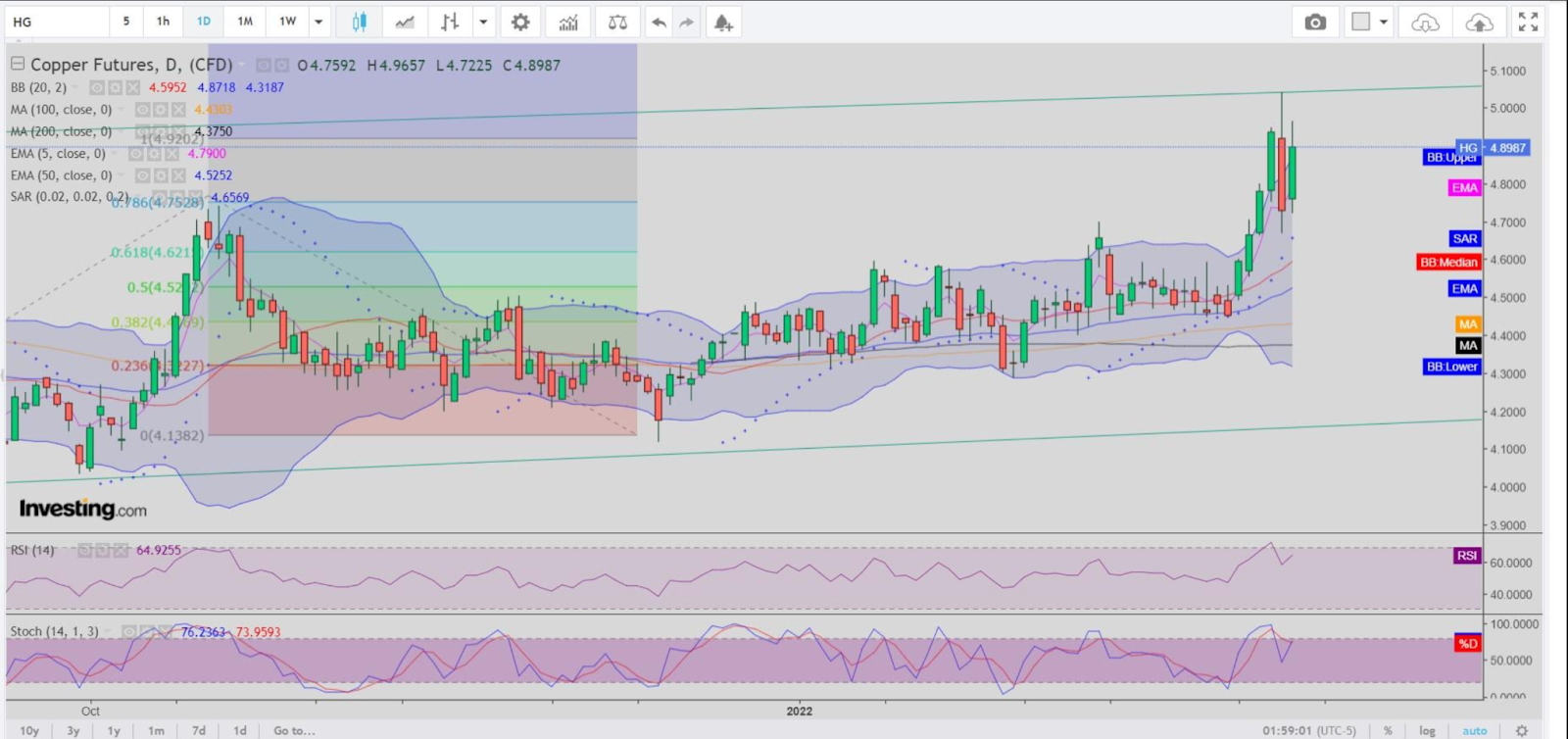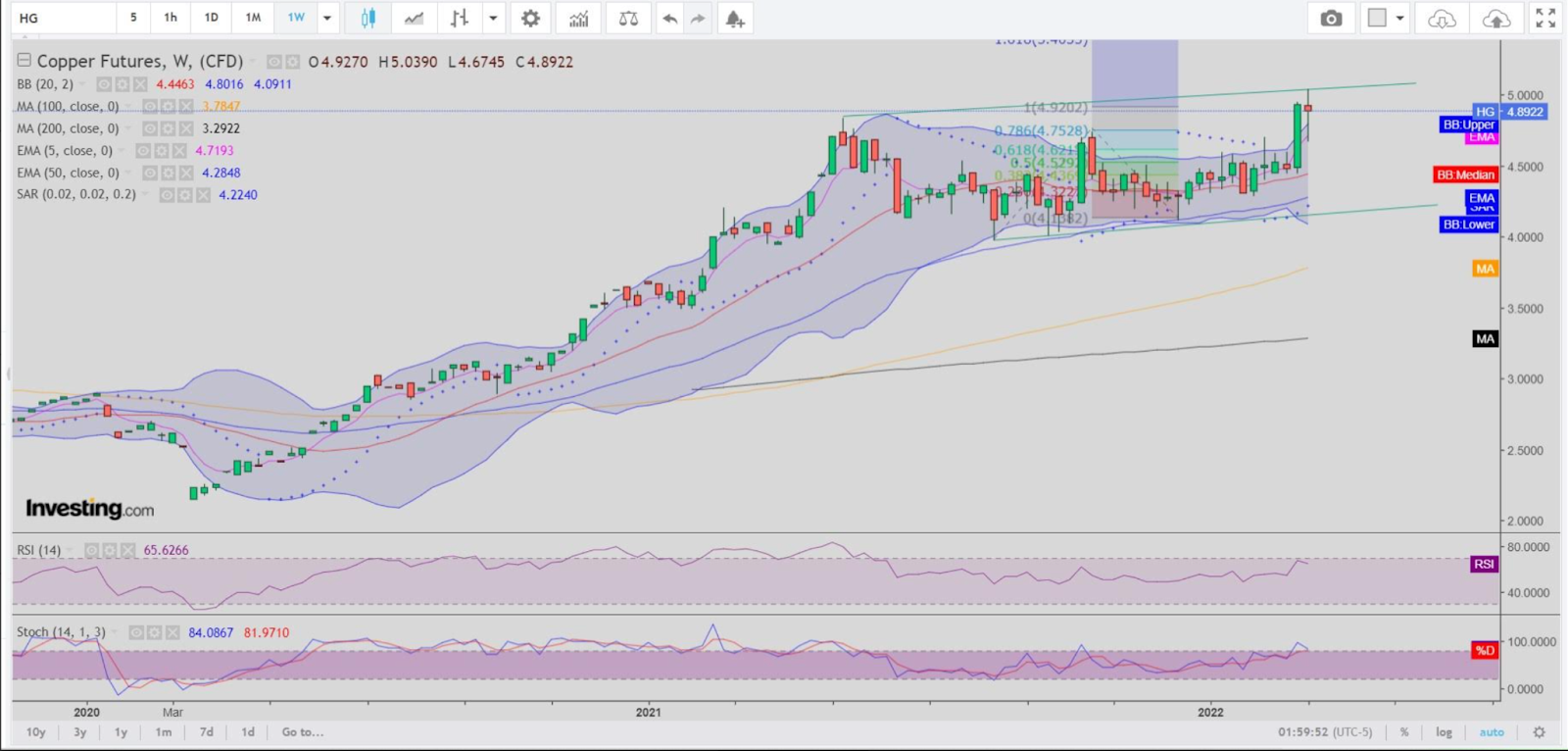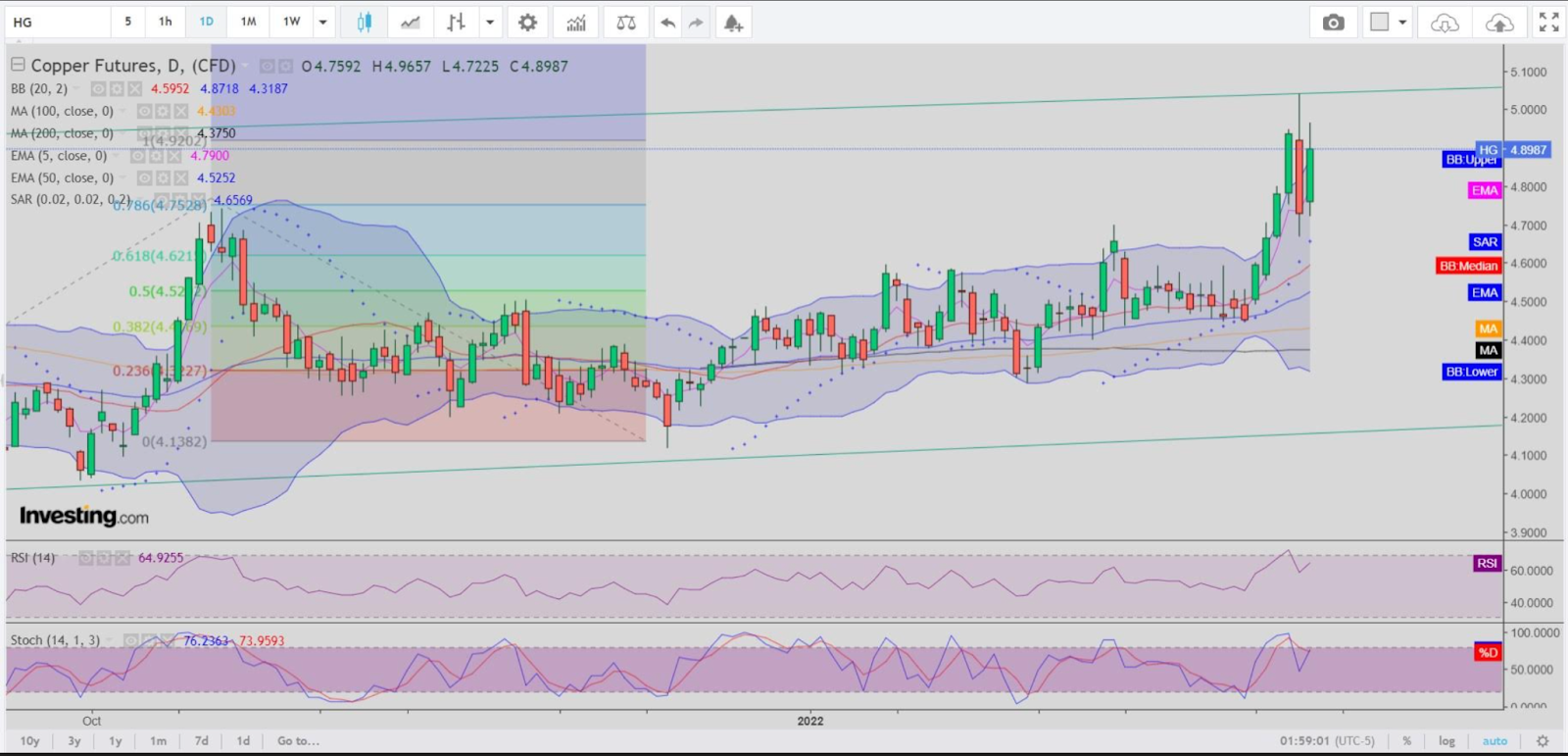Copper has hit record highs for the past five days as the West’s blockade of Moscow’s economy over the invasion of Ukraine triggered a buying mania in almost every commodity Russia has influence over—or just found to be in short supply.
Indeed, inventories of copper at warehouses accredited by the London Metal Exchange have been tumbling in recent days, reaching 69,825 tonnes at Monday’s count for the lowest LME stockpile since 2005.
So, as oil, nickel, palladium and wheat surged to either record highs or peaks seen before the Great Recession of 2008, copper got a ride up too—from the Russia-Ukraine high tide that lifted all commodity boats at once.

Charts courtesy of skcharting.com
Still, there was a fundamental difference between copper and the rest of these commodities: the Russian influence—or rather the lack of it—in this so-called ‘red metal.’
As Bloomberg noted in a Monday story, Russia isn’t a major copper player, producing just about 3.5% of the world’s copper. In other words, copper itself is quite ‘Russia-insulated.’
It’s not like nickel, which Russia accounts for 7% of and which witnessed the ‘parabolism of parabolism’ on Monday via a 94% price rally that took it to a record high of $56,041 on the LME.
Neither in the Russian context does copper have the status of palladium—the autocatalyst metal that the Russians have 40% supply control over and which hit record highs back-to-back for two days on New York’s COMEX, peaking at $3,417 an ounce on Monday.
But still copper joined the commodities fervor of the past week as the Russia-Ukraine conflict “fanned the flames of the already-stretched base metals markets,” precisely when copper stockpiles were plummeting, ING analyst Wenyu Yao was quoted as saying by Reuters.
The tumble in LME copper supply came as Chile, responsible for more than a quarter of global copper production, recorded its lowest January output since 2011, according to government figures reported by Bloomberg on Monday.

Chilean copper production is expected to recover to register a similar annual haul as last year, according to the president of the country’s mining society.
The world’s biggest copper supplier saw output slide 7.5% from January 2021, with lower ore quality and water scarcity among the reasons.
But in some cases, the factors holding back output are temporary, said Diego Hernandez, a former chief executive of Codelco and Antofagasta, who now heads Sonami, the umbrella group for Chilean miners.
“This year should be the same as last year or maybe slightly less,” Hernandez said on a call on Thursday, Bloomberg reported.
So, what would an improved production, to 2021 levels, do to copper prices?
And more importantly, how would that tie into the red metal’s position as an indicator of the economy, especially if the Russia-Ukraine crisis lasts enough to bring on a recession devastatingly bigger and more enduring than the one in 2008?
In a blog that appeared on MarketWatch on Monday, opinion writer Mark Hulbert said that ‘Dr. Copper’—as the metal is known for its supposed ability to diagnose the health of the economy—anticipated some of the US stock market’s turning points between 1984 and 2020. But he also noted that copper prices have lagged the S&P 500’s moves on various occasions during that span.
My call is that even if Chilean production does not dramatically recover over the next 12 months, near-term demand for copper might not be robust unless the fallout from the Russia-Ukraine is totally contained.
Also, runaway inflation—already at 40-year highs in the US—and formidable rate hikes planned by global central banks will likely stunt growth, even if they don’t land us in a 2008-style recession or one worse than that.
Consumption of copper by China, the world’s top importer of the metal, has been somewhat suspect since the start of 2022.
“Metals-intensive sectors of China’s economy continued to cool in December (and) investments into the infrastructure and property sectors are still shrinking," Julius Baer analyst Carsten Menke said in a mid-January report.
Even a 9.6% rise in China's unwrought copper in the first two months of the year compared with the same period of 2021 was due to an unexpected delay in shipment arrivals that pushed up imports, analysts said.
And much of that was before the Feb. 24 invasion of Ukraine by Russia.
Thus, Dr. Copper could be one of those important indicators to closely watch in the coming months as the first signs of a recession from a prolonged and heightened war could be reflected in the red metal first.

Copper’s most-actively traded May contract on New York’s COMEX hit its first record high on Mar. 2 at $4.7050 per lb, before following that up with all-time highs over four consecutive days that rested at $5.0395.
Sunil Kumar Dixit, chief technical strategist at skcharting.com, said chart-wise, copper’s most recent price change “did not alter the metal’s main bullish trend, which continues to move within an ascending channel.”
He added:
“While recent corrections hint at lack of positive triggers, prices are likely to move sideways with mixed reactions until they gain energy to break back above $5.14 and test $5.46, which is a 161.8% level of the trend-based Fibonacci extension.”
He said stochastic and Relative Strength Index parameters for copper were supportive of bullish momentum.
“For the time being, we expect prices to move between $4.65 - $5.00.”
But Dixit also cautions that failure to break and sustain above the $5.00 psychological mark, followed by a daily close below $4.75 should be seen as the first sign of exhaustion.
He said weakness below $4.75 could push copper down to the $4.60 level, which coincides with the middle Bollinger Band and further horizontal support areas of $4.45 and $4.3—all acceleration points to the downside.
“Three daily and one weekly close below $4.30 is all that may be required to change the mid-term trend to bearish, and have targets of $4.04 and $3.50.”
Disclaimer: Barani Krishnan uses a range of views outside his own to bring diversity to his analysis of any market. For neutrality, he sometimes presents contrarian views and market variables. He does not hold a position in the commodities and securities he writes about.
